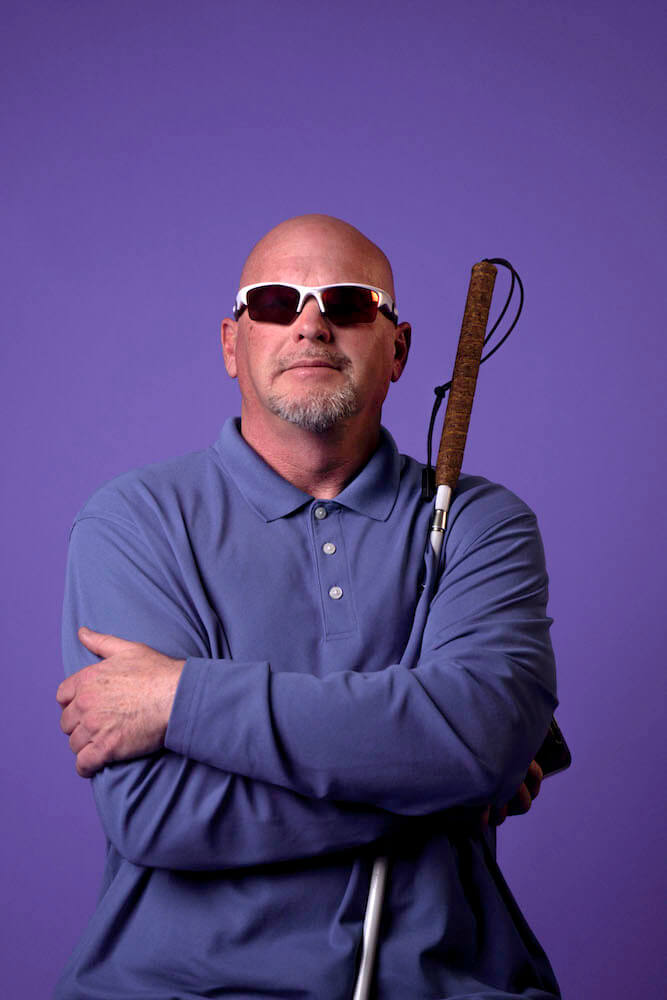About Joey
Joey Richey was diagnosed with retinitis pigmentosa at the age of twelve. This condition caused him to slowly lose his sight until he became completely blind.
JHe worked for a long time as a personal trainer and coach, but when he finally became fully blind, he went back to school to become a vocational rehabilitation counselor.
He now works for the Alabama Institute for the Deaf and Blind, where he teaches people how to use a cane and learn Braille. He says that he now feels like he is “finally a coach.”
Joey Richey on Ableism
[00:00] My name is Joey Richey, and I have a visual condition called retinitis pigmentosa, which is a progressive retinal degenerative disease. And I was diagnosed at the age of 12 and it has slowly progressed over time. And now I'm considered to be blind, and I have really no usable vision.
[00:26] You know, I was a typical little boy, wide open, played lots of sports. Really didn't know that I didn't see well. I thought everybody saw like I did. The doctors, quote, I can tell you exactly what they said. They said, "You will eventually be blind. We recommend that you go to the school for the blind in Talladega, and you learn to sew flags and sell pencils." And yeah, that was just like, yeah, I'm not going to a different school. I am not blind now. And who knows when that will happen. And I will continue to do what I was going to do. So I continued life as is.
[01:15] Initially I was in denial. It's just like, No, I'm not going to do anything different. And I didn't. I refused to do a cane. I refused to go to the blind school. They told me that eventually I would lose all my sight, it would be a good idea to learn braille. I never picked it up, never tried it. So, you know, I work with a lot of young people now going through a lot of the same things that I went through. And I think the reason I'm good at my job is because I understand where these kids are coming from. They don't want to be different, okay, I'm gonna put a cane in your hand, and you're gonna have to carry that cane, and it's white, it's got a red tip. And it might make a lot of noise. They don't want to do that. They don't want to do anything that sets them apart of being different. And I was the same way.
[02;02] So I'm going up to find the elevator button, and I know the general area where the button to the elevator is. So I reach out to touch the wall and to find the elevator button. And some-, remember I have that peripheral vision loss, somebody has walked in to my blind spot that I don't see. I reach out and it's a woman, and I'm actually grabbing her breast. So after a very harsh talking to, and that's being mild, and me trying to explain that I'm visually impaired. I'm blind. But I don't have a cane. I don't have glasses, you know, she doesn't understand. And it was in a very, very embarrassing moment. And at that point in time, I said, you know, it's not just about me, it's about other people that need to understand that I don't see, and to help them understand that I may need help in certain situations. So after that day, I started using a cane.
[03:05] So that's why it's important you know, when I talk to people about the importance of using your cane, even though you get around okay. It's because you don't know what you don't see. And I am a vocational rehabilitation counselor. I work with the Alabama Department of Rehabilitation Services. I primarily work with the blind and visually impaired population. I am married to my wife, going on 20 years. We have two dogs and three cats. And we have a nice home and a nice family. And I love what I do. And I love helping people.
[03:46] And I tell people all the time, that I'm finally a coach, because that's exactly what I feel like I'm doing is I'm helping people learn to play the game of life, to be successful at the game of life in spite of their disability or impairment. So I give them the tools, I give them the training, I give them the motivation to be successful and whatever their goals are.
